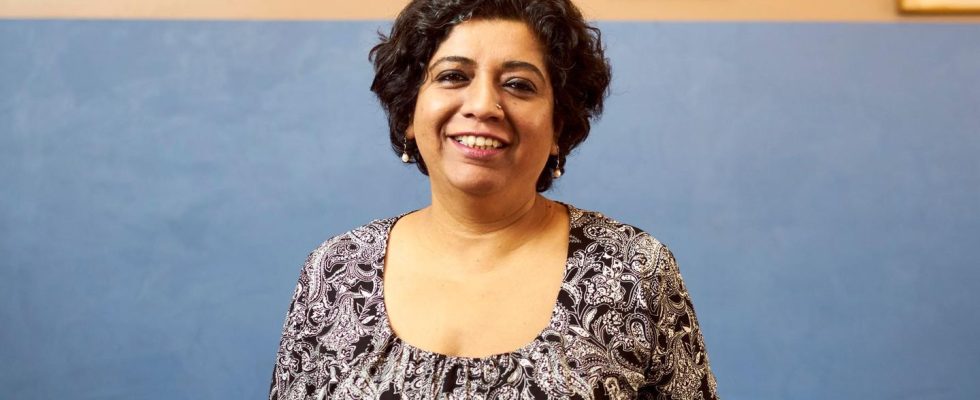#Metoo in gastronomy
London cooking luminary Asma Khan on abuse of power in kitchens: “The industry is rotten to the core”
Asma Khan is a qualified lawyer with a doctorate, but cooking is her calling.
© Justin Lambert, AT Verlag / www.at-verlag.ch
Asma Khan is a fighter, she wants to eradicate abuse of power in the catering industry. In an interview, she explains how bad things are in (top) kitchens today and why a Metoo movement in the catering industry is still not to be expected.
Asma Khan is one of London’s most famous chefs. Even King Charles recently announced himself for dinner. So much honor for a woman who has a doctorate in law but no classical culinary training. Khan is a career changer who started cooking solely to feel less alone in a foreign country. It became her passion and an emancipatory act of liberation. Khan is known not only for her cooking talent, but also for the special concept behind her restaurant “Darjeeling Express”. The restaurateur works with an all-female kitchen brigade. In doing so, she sets a counterpoint in an industry that, in her opinion, is “rotten to the core.” The Khan told the “Times” how bad things are in (top) kitchens today and why a Metoo movement in the catering industry is still not to be expected.
Khan is a woman who lets little be said but has a lot to say. The 54-year-old has been committed to eradicating gender injustice in the cooking industry for years. To do this, she sometimes takes on the famous Michelin restaurant guide. She demanded that chefs’ stars should be withdrawn if they were guilty of allegations of harassment. But the restaurant guide blocked it, saying such things are difficult to check. The chef in question at the time still works in the same position.
Abuse of power in top restaurants is everyday life
It is now widely known that this case is not an isolated incident. Renowned restaurants have repeatedly made negative headlines in recent years. The allegations: abuse of power, humiliation, physical abuse, sexual harassment – the list goes on. Just a few weeks ago, she was reminded of how bad things are in some places when, after a lecture in Rome, she found herself surrounded by female cooks who complained about their suffering. The French women told Khan “the most heartbreaking stories” about what they were going through. Among other things, they showed her scars that they acquired in well-known kitchens. A situation that Khan described to The Times as “soul-destroying.”
Star chefs are still rare. Of all the stars that Michelin awarded worldwide, only around six percent went to women. There are too few women in the kitchen, although more and more of them are working in the kitchen, said the guide’s international director, Gwendal Poullennec, recently at the star awards ceremony in France. “This is a reality that we deplore.”
Khan has something else to complain about. She says that the catering industry is the only one “where physical and sexual violence against women is allowed and is excused because [der] “The pressure is on.” Bad behavior remains commonplace in kitchens. The abusive methods only serve to puff up the chests of playground bullies who bully others they consider weaker, Khan said. Chefs who deal with the Those who can’t handle pressure have no place in the kitchen, she says, and suggests banishing abusive chefs into exile in “a yoga ashram in the Himalayas.”
Female chefs are too afraid to stand up to abusive bosses
The problem runs deep. And Khan is not convinced that female chefs are starting the big revolt; in her opinion, there will be no MeToo movement in the gastronomy world. Too many people are still afraid to speak publicly about the injustices they have experienced. The fear of losing your job or even being ostracized throughout the industry is too deeply rooted. This fear is not irrational. Khan himself knows of several such cases. She therefore appeals, above all, to women in positions of power, the world’s star chefs, to speak up.
The London restaurateur knows that it is possible to have a kitchen in which everyone feels comfortable. Your restaurant is repeatedly praised as exemplary for the exemplary tone in the kitchen and the way the staff treat each other. Only immigrants work in the “Darjeeling Express” team; none of them have professional culinary training, but all are experienced home cooks. Why did she choose this concept? “Whether in India, Pakistan or Bangladesh – it is the women who cook for their families. But only men work in the restaurants. The work of women is not recognized or even paid for,” she once explained in a stern interview.
Khan gives women a place where their work is valued and where equality is not just an empty phrase. Every employee receives the same salary, including you and regardless of your level of skill. “Every person should receive equal respect,” says Khan. You pay for the work, time and effort that is invested. “I know I’m different. Maybe I’m an idealist, but is that wrong? It’s about respect,” she says. Respect is a word she pronounces as if it were written in capital letters. “In doing so, I also honor my mother and all the other women in my family who are not treated equally.”



